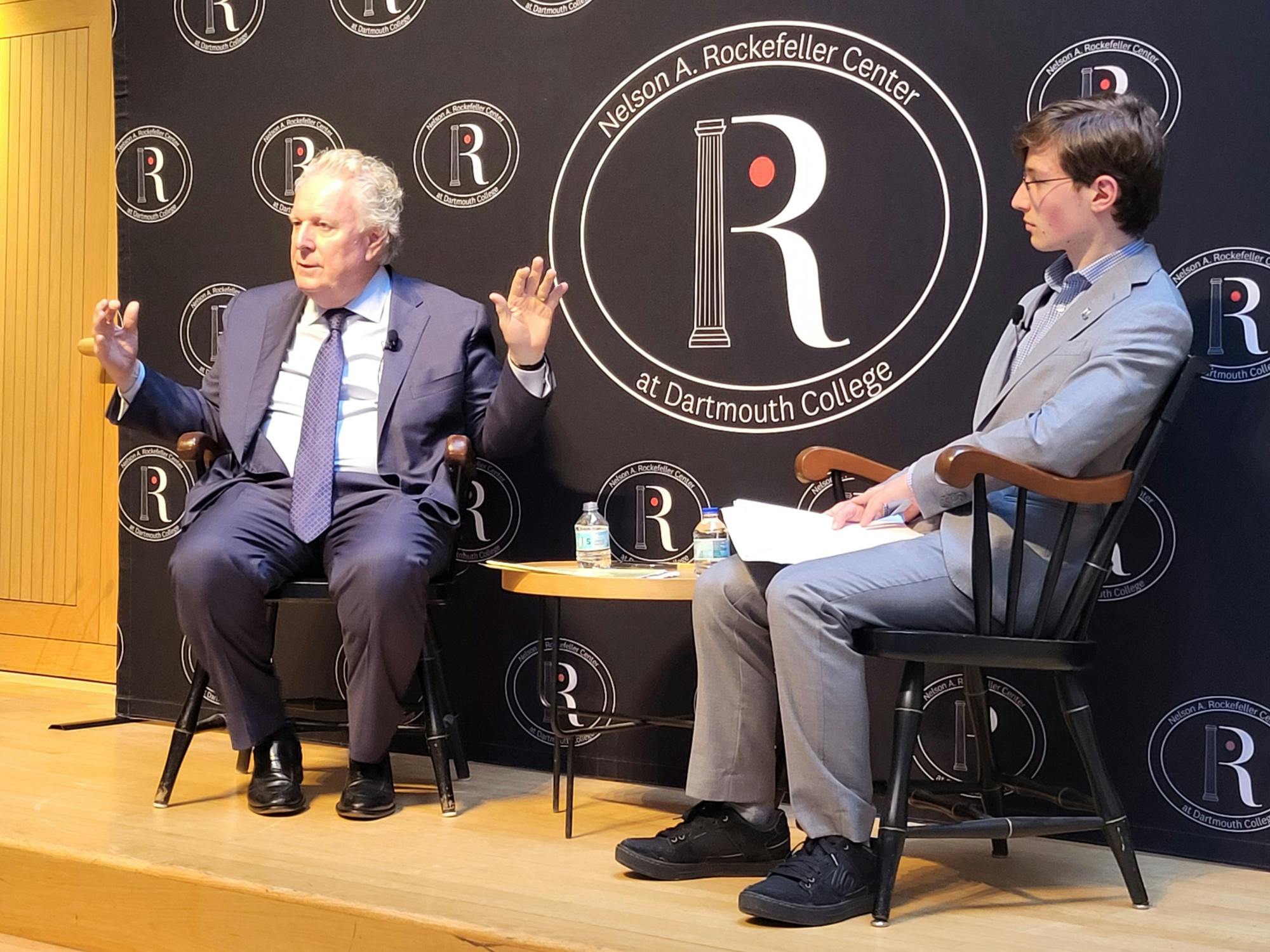On April 11, former Québec premier Jean Charest gave a lecture titled “Conservative Environmentalism,” hosted by the Rockefeller Center for Public Policy.
In his lecture, Charest — who also served as the Canadian minister of the environment from 1991 to 1993 — spoke about the country’s history of conservative political leaders. Charest focused on former Canadian prime minister Brian Mulroney — a member of Canada’s Progressive Conservative Party and the “greenest” prime minister in the country’s history, Charest said.
Approximately 50 people attended the event in the Hinman Forum and 32 people streamed the event on YouTube, according to Rockefeller Center assistant director for public programs Dvora Koelling. Planning was “student-driven,” led by event moderator Luke Montalbano ’27 and the American Conservation Coalition, according to Rockefeller Center director Jason Barabas.
The event is part of an effort to “capture a broad array of perspectives” at Rockefeller Center events, Barabas said.
“[Environmentalism] is going to be a world-wide solution and issue, but this particular [event] was an opportunity to hear from somebody a little closer to home,” Barabas said.
According to Charest, Mulroney was elected as the leader of the Progressive Conservative Party of Canada in 1983 during a resurgence of conservative world leaders and growing prominence of environmental issues. Mulroney established himself as an environmentalist early in his career, advocating for the George H. W. Bush administration to pass the Clean Air Act Amendments of 1990. Charest praised the legislation for being “among the most successful” environmental treaties in the world.
“A lot of the comments about Brian Mulroney [after his death] were about his environmental record and what he accomplished as a conservative,” Charest said. “A lot of that is in direct relationship with the United States and what was accomplished with the American administrations of President[s] [Ronald] Reagan, [George H. W.] Bush and [Bill] Clinton.”
According to Charest, the Mulroney administration was also “front and center” in the implementation of the Montreal Protocol, which controlled the destruction of the ozone layer by phasing out ozone-depleting substances.
“[The Montreal Protocol] was also a trading system using economic instruments, and the Reagan administration signed onto it … because they were very much a conservative government [that] accepted and knew that the most efficient way in their view of addressing these issues was to use economic instruments,” Charest said.
Charest added that the Montreal Protocol would “not have been possible” without the “engagement” and financial, technical and scientific resources of the United States government. He said the economic relationship between the United States and Canada is a critical issue that a Canadian prime minister “has to get right.”
“Stop [for] a moment to think of the privilege we have of either being born or being a citizen of one country or the other — and we’re each other’s neighbors,” Charest said. “Yet the danger … is that we take this relationship for granted and that we don’t pay enough attention to each other.”
Jacob Markman ’27 said he attended the event because the title “caught [him] off guard.”
“There’s oftentimes the conception that conservatism and environmentalism are … in opposition,” Markman said.
While he found Charest’s speech “encouraging,” Markman said he wished Charest spoke more about “exact economic incentives” and ways to “encourage environmentalism.”
Barabas said he hoped attendees walked away with a better understanding of “the importance” of climate change as “one of the foremost challenges that we all face.”
“I love the moments when he is talking about public policy and the design of public policy and getting it right,” Barabas said. “You [have] to be thinking about these kinds of issues from many different angles and many different perspectives.”
Kelsey Wang is a reporter and editor for The Dartmouth from the greater Seattle area, majoring in history and government. Outside of The D, she likes to crochet, do jigsaw puzzles and paint.




